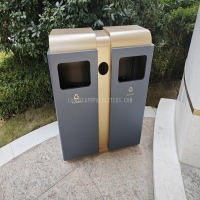Welcome to the website for landscape facilities products and knowledge.
What are the environmental impacts of the materials commonly used in landscape bar counters?
The choice of materials for landscape bar counters significantly influences both the aesthetic appeal of outdoor spaces and their environmental footprint. While these structures enhance social gatherings and property value, their construction often involves materials with substantial ecological consequences that warrant careful consideration.
Traditional hardscaping materials like natural stone, particularly granite and marble, carry heavy environmental burdens. Quarrying operations disrupt local ecosystems, cause habitat fragmentation, and generate considerable dust and noise pollution. The transportation of these dense materials across long distances further compounds their carbon footprint, with some studies indicating that imported stone can accumulate transportation-related emissions representing up to 30% of its total environmental impact.
Concrete, another popular choice for outdoor counters, presents a complex environmental picture. While durable and versatile, conventional concrete production is exceptionally carbon-intensive due to cement manufacturing, which accounts for approximately 8% of global CO2 emissions. The extraction of aggregates for concrete can also degrade local landscapes and deplete natural resources. However, innovations in concrete technology, such as incorporating fly ash (a industrial byproduct) or using carbon capture methods during production, are gradually reducing this material's environmental impact.
Composite wood products, including pressure-treated lumber, often contain chemical preservatives like copper arsenate or chromium that can leach into surrounding soil and waterways. These substances may potentially harm local flora and fauna and raise concerns about long-term soil health. Additionally, the sourcing of wood from non-sustainable forestry operations contributes to deforestation and habitat loss, particularly when tropical hardwoods are used.
Modern alternatives are emerging that offer reduced environmental impacts. Recycled glass countertops repurpose post-consumer and industrial glass waste, diverting materials from landfills while creating durable surfaces with unique aesthetic appeal. Reclaimed wood brings character and history to outdoor spaces while eliminating the need for new timber harvesting. Some manufacturers now produce counters using compressed recycled paper or agricultural waste products like rice husks or sunflower hulls, creating durable surfaces with minimal virgin material content.
The longevity and maintenance requirements of materials also factor into their environmental assessment. Durable materials that withstand weathering without frequent replacement or chemical treatments generally offer better life-cycle sustainability. Proper sealing and maintenance can extend material lifespan, reducing the frequency of replacement and associated waste.
When selecting materials for landscape bar counters, considering local availability can dramatically reduce transportation emissions. Regionally sourced stone or locally manufactured products typically have lower embedded energy costs. Additionally, evaluating the entire life cycle of materials—from extraction through disposal—provides a more comprehensive understanding of their true environmental impact.
As sustainability becomes increasingly important in landscape design, manufacturers continue developing innovative materials with reduced ecological footprints. By choosing responsibly sourced, durable, and preferably recycled materials, homeowners can create beautiful outdoor entertainment spaces that minimize environmental harm while maximizing enjoyment and functionality.
Related search:

Recommendation
Double-bucket garbage bin, outdoor, metal, multi-color, powder-coated, double-bucket trash can